By: Moehammad Amar Ma’ruf; Senior Diplomat, Ministry of Foreign Affairs of the Republic of Indonesia and University of Indonesia’s Post Graduate in Islam and Middleeast Studies.
Reading ability as a basic need for human being may not be fully understood by all peoples living in modern world. Certain peoples sometime ignore that Reading Ability is a noble message sent down directly by the Almighty God to His messengers to make human beings becoming dignified living on earth.
Ability to read is a way forward to make peoples be able to get knowlegde on many aspects, especially knowing about human existence and for what human being is created and for what the Universe is created.
Ability to read/write through education is part of fundamental right. Through education, human being is expected to get more opportunities to upgrade their understanding and skill in order to be able to protect their existence and their environment to be developed in a more sustainable manner. So being able to read, it will help human being create and maintain their better civilization from time to time.
Also Read: 77 Years Since Nakba, Palestinian Population Grows Tenfold
Ironically, nowdays where the advance technologies especially in comunication and information sectors make seem world borderless, the illiteracy rates among world population is still found and high, especially in the developing and less developed countries. This situation will make capacity and capability of the peoples in the countries with high illiteracy rate less competitive than the countries that have literaly ones.
There are several factors that make illiteracy rate still high. According to the 2018 UNESCO’s annual report mentioned that limited access to the education services and lack of professional teachers are among the factors.
Nevertheles, there are still artificial factors that support or even make illiteracy appears and high, such as colonialism/conflicts. Many proofs showed that if this situation happened, it usually make affected peoples becomes suffered, isolated and left behind or even destroyed, including its infrastructure. And, then the affected area are neglected for a long time.
Other situations that may also cause lack of literally population is natural disaster that make human civilization and all infrastructure lost. Historically it showed that many areas lost after striking by natural disasters and buried for a long time. After that the remnants/sites of the lost area are found. This kind of area usually isolated and left behind.
Also Read: Indonesia Must Do More Than Evacuate, Gaza Needs Us to Act Now
Human races and civilization are fully of confrontation in order to get better property (prosper land) among them. Let us mentioned some of the ancient civilizations such as peoples lived in the period of Mesopotamia and Old Egypt until middle ages. These ancient peoples lived near river bank of Mesopotamia and surrounding. In this area, it found many historical sites and old manuscripts that describe the well mastering nations in the field of science, ethical and believes (high literal society).
It indicates that the ancient people who lived around thousands Before Christ (BC) were capable and skillful in reading/writing. The things that make this are popular is their abundance resources and water (geostrategic aspect). But what happen after that, the glory of these communities seems disappeared. Many Holy Books and Historian say that this happened (disappearance) due to natural disasters. This event happened as reminders to the unbelievers of the God Messengers that invites peoples to avoid destruction on earth (to human and environment).
Inevitably, this situation makes the peoples in the affected are becoming victims and left behind. With their complexities, this needs long time to progressive investment on human resources to make the affected peoples becoming literacy peoples.
The above issues seem still becoming homework’s and responsibility for civilized peoples and nations that exist today. According the UN membership, nowadays there are 193 sovereign states. In fact, most of more than half of UN member are still developing and less developing countries where the rate of illiteracy still found high average above 10 % to 80 % of respected countries population.
Also Read: The Recitation of Surah Al-Isra from Jakarta for Palestine
If we look to the case of Illiteracy of the Organization of Islamic Cooperation (OIC) member countries which are consists of 57 countries, we can see the similar issues to be handled in eradicating illiteracy problems.
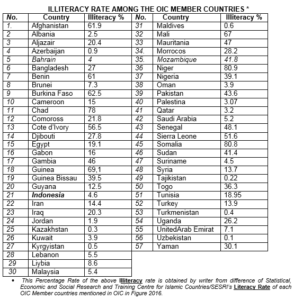
The above situation also brings to new concern and dimension to be improved in the future. The research found that illiteracy rate is most experienced by women. This will imply more dynamic and specialized approaches to eradicate illiteracy among countries in the OIC Countries and in the world. These approaches will involve more technical stakeholders to help the people concerned and all sexes gain more opportunities to get their basic need. For the case of Arab and African Region, the case are quite challenging if we see another report beside the above statistic report. The 2014 ALECSO report, as a regional organization under the Arab League based in Tunis, describe that almost 60 % of the illiteracy rate is experience by women and the 39, 4 % is experienced by men.
The eradication approach in the world become more complex since the world population increase to 7.5 billion (US Statistical Agency Report 2018), conflicts and natural disaster still exist. These need sustainable action and participative action from all member of the International Organization such as United Nations and the Organization of Islamic Countries. At same time, the global, regional and nationals’ leaders should also worry that there are many people in the world including in their own countries still living in illiteracy.
Also Read: The Importance of Environmental Awareness in Da’wah
Many efforts to eradicate illiteracy are doing in the international, regional and national levels. In many meetings of Heads of States and Ministerial Meetings have the same view and commitment to eradicate literacy by providing adequate access to education for their peoples.
In the OIC’s forum, this organization has made some progresive steps to solve this issue by doing some measures sustainably. This organization has established the Islamic Development Bank (IDB) and its development cooperation program such as Reverse Linkages. Under this program, member of OIC/IDB countries may exchange their best practices. Furthermore under the Program of Action of the OIC Vision 2025, the leaders of OIC member countries have committed to increase their attention to the provide adequate education services as stipulated in the OIC program of action 2025 document as follows:
“……With an average adult literacy rate of 72.3 %, the OIC Member States as a group lagged behind the world average of 82 % and also other developing countries’ average of 84.5 %. Despite being an important strength, youth population faces considerable challenges. In their social and economic situation in a significant number of Member States, Inadequate education and lack of required skill make it especially difficult for youth in finding jobs in the labor market. It is necessary that the member states enhance the share of their annual GDP for education sector.”
In line with that also, the UN Body is mainstreaming the effort in eradicating illiteracy through education into one of the 17 the Sustainable Development Goals/SDGs 2030, namely the Goal 4 to do and support the Quality Education.
Also Read: Interfaith Dialogue and the Middle East Conflict
Indonesia as a member of the UN Body and also the OIC/ODB has stressed its vision and mission to provide adequate services to education sectors. Based on these efforts, in 2018 Ministry of Education and Culture of the Republic of Indonesia has successfully reduced the illiteracy rate. According to the Indonesian Education and Cultural Report 2018 report, only 3.4 million (2.07 % under the age 19-59) peoples from 265 million Indonesia’s population still in illiteracy. Indonesian government takes sustainable measures to generate this achievement. Indonesia applies the policy to involve public participation and culture diplomacy in the national and international level.
Recently during the meeting between the Director for Literacy and Equivalency Education Development-Directorate General of Early Childhood Education-Ministry of Education and Culture of the Republic of Indonesia, Dr. Abdul Kahar and the Writer (Jakarta, 22 May 2019), The Director assures the willingness to share their capabilities to other countries and cooperate with other countries and international organizations to make less burden of the world in eradicating illiteracy in the world. This is a humble offer from Indonesia to the UN or OIC Member countries and other multilateral organizations and to other individual countries in the world to eradicate Illiteracy in the world.
May Allah Azza wa Jalla help the World to reduce this Illiteracy. Wallahu’alam bi showab.(AK/R01/P2)
Also Read: Israel’s Underground Prison, Where Hamas and Hezbollah Fighters Are Held in Extreme Conditions
Mi’raj News Agency (MINA)





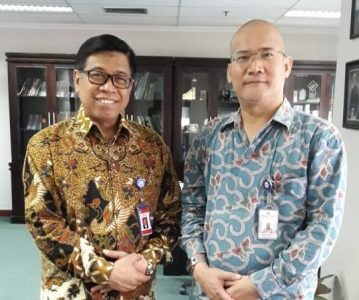



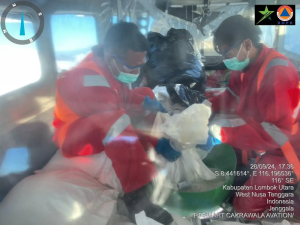



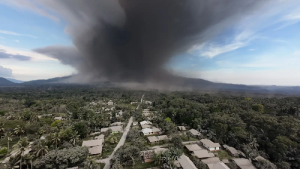
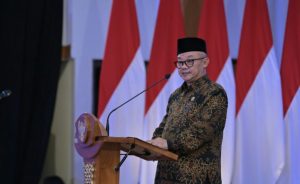

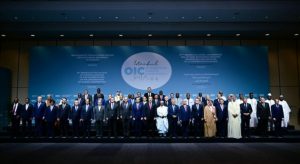


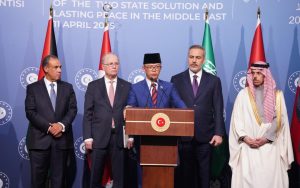





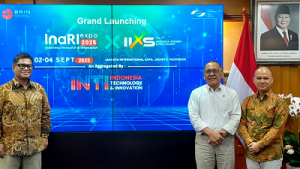

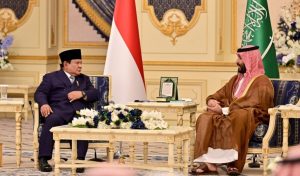






 Mina Indonesia
Mina Indonesia Mina Arabic
Mina Arabic